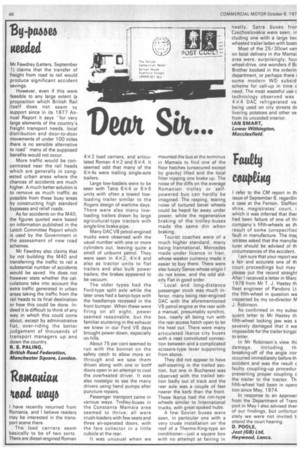13g-pcom laded
Page 50

If you've noticed an error in this article please click here to report it so we can fix it.
Mr Fawdrey (Letters, September 1) claims that the transfer of freight from road to rail would produce significant accident savings.
However, even if this were feasible to any large extent (a proposition which British Rail itself does not seem to support since in its 1977 Annual Report it says "for very large elements of the country's freight transport needs, local distribution and door-to-door movements of under 100 miles there is no sensible alternative to road" many of the supposed benefits would not occur.
More traffic would be concentrated near the rail heads which are generally in congested urban areas where the chances of accidents are much higher. A much better solution is to remove as much traffic as possible from these busy 'areas by constructing high standard bypasses and relief roads.
As for accidents on the M40, the figures quoted were based on information published in the Leitch Committee Report which is used by the Government in the assessment of new road schemes.
Mr Fawdrey also claims that by not building the M40 and transferring the traffic to rail a substantial number of accidents would be saved. He does not however state whether the calculations take into account the extra traffic generated in urban areas taking the traffic from the rail heads to its final destination or how this could be done. Indeed it is difficult to think of any way in which this could come about, except by administrative fiat, over-riding the better judgement of thousands of transport managers up and down the country.
R. S. PALING, British Road Federation, Manchester Square, London.


























































































































































